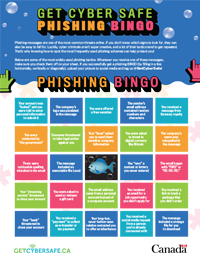
Phishing messages are one of the most common threats online. If you don’t know which signs to look for, they can also be easy to fall for. Luckily, cyber criminals aren’t super creative, and a lot of their tactics tend to get repeated. That’s why knowing how to spot the most frequently used phishing schemes can help protect you!
Below are some of the most widely used phishing tactics. Whenever you receive one of these messages, make sure you check them off on your sheet. If you successfully get a phishing BINGO (by filling in a line horizontally, vertically or diagonally), upload your picture to social media and tag us @GetCyberSafe!
Your account was “locked” and you were told to enter personal information to unlock it
The company’s logo was pixelated in the message
You were offered a free vacation
The sender’s email address contained random numbers and characters
You received a message from faraway royalty
You were contacted by “the government”
Someone threatened to take legal action against you
Your “boss” asked you to send them sensitive company information
You were asked to invest in digital currency like Bitcoin
The company’s name was misspelled in the message
There were noticeable spelling mistakes in the email
The message included an executable file (.exe)
Free space
You “won” a contest or lottery you never entered
The email began with “FWD” or “RE: RE: RE:”
Your “streaming service” threatened to close your account
You were asked to send or redeem a gift card
The email address came from a personal account instead of a company account
You received an email for a job opportunity you didn’t apply for
You received a link to track a package that you didn’t order
Your “bank” threatened to close your account
You received a “payment” to collect an e-transfer or tax payment
Your long-lost, never-before-seen relative contacted you to offer an inheritance
You received a social media request from a person you’re already connected with
The message included a strange file for you to download
